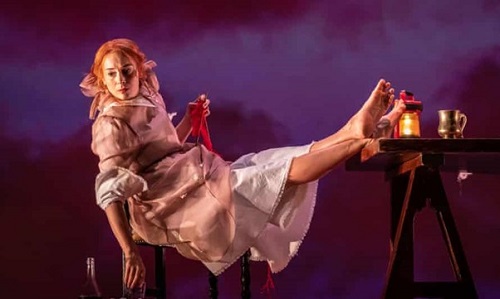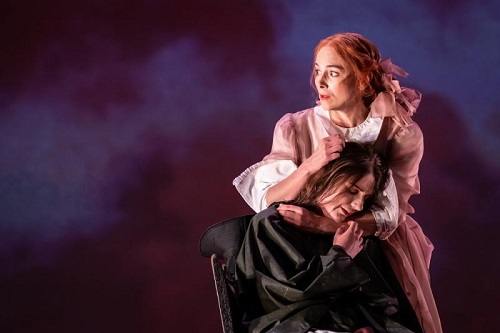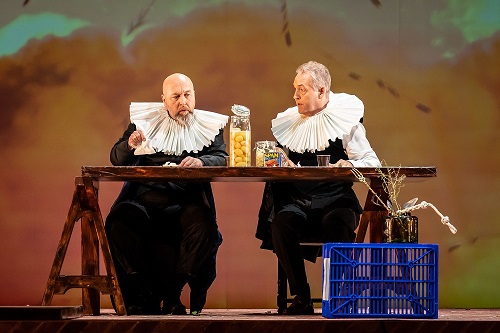I had a dream, which was not all a dream.
The bright sun was extinguish’d, and the stars
Did wander darkling in the eternal space,
Rayless, and pathless, and the ice earth
Swung blind and blackening in the moonless air.
Travelling home and ruminating on this London premiere of Tom Coult’s first opera, Violet, I was put in mind of Byron’s ‘Darkness’, a poem prompted by a natural catastrophe – the historical events of the 1815 eruption of Mount Tambora, which led to a so-called ‘year without a summer’ – but which imagines a human catastrophe that defies rationalisation. As the semi-synchronous nested systems of nature and man collapse into each other, so ‘men forgot their passions in the dread/ Of this their desolation; and all hearts/ Were chill’d into a selfish prayer for light’. Everything is burned – the thrones and palaces of kings, huts, cities – in a ‘fearful hope’ that men might ‘look once more into each other’s face’. Yet, ‘all was black’. As, the wheels of Time spin mankind towards the abyss, ‘The meagre by the meagre were devoured.’ The perpetual darkness is both the absence and presence of God, a result of man’s unholy acts. The ‘end of the world’ is a terror, literal and figurative, a total annihilation which it is almost impossible to conceive, because there is no saving force – only ‘selfish’ prayers.

Byron’s thought-experiment is re-enacted in Coult’s Violet. The immediate literary prompt for Alice Birch’s spare, quasi-ritualistic libretto – one that seems to strive for the mundane yet admits strange, dazzling imaginative flourishes – is Edgar Allan Poe’s short story, ‘The Devil in the Belfry’, in which the inhabitants of Vondervotteimittiss (wonder-what-time-it-is), obsessed with clock-watching and cabbages, are propelled from order to chaos by a strange fiddle-player who attacks the belfry man and sets the clocks chiming an Orwellian thirteen o’clock.
In Violet time is running out. Over 24 days, hours are lost, one each day. What would you do if, incomprehensibly, the thread connecting past, present and future was being stretched to snapping point? If a temporal black hole was opening up, a devouring chasm? Would you set forests on fire, like the desperate men in Byron’s poem, to defy the darkness? Would you conduct sacrifices of livestock and children as Violet’s fellow villagers do, or like Felix, Violet’s abusive husband, would you consult the clock-keeper to find out what was going on? Or, like Violet – trapped in a stagnant, static and life-stifling routine, dominated by inescapable regularity – would you see annihilation as a form of liberation? Build a boat and set off, over the horizon, into the unknown?

Planned for 2020, put on hold (with bitter irony) by the pandemic, Violet is a Music Theatre Wales, Britten Pears Arts and London Sinfonietta collaboration. It was premiered at Snape Maltings earlier this month and, having had a short tour, reached the Hackney Empire for its London premiere. Violet lives in the largest house in the village with her husband, Felix, and maid, Laura. Every day is the same, until it isn’t. The change – the daily loss of one hour – is at first noticed only by Violet, though it is charted by the clock-keeper whose horological tower is a guillotine which beheads each ensuing day, until there is nothing more to cut away – only the body of Felix to hang.
Director Jude Christian, designer Rosie Elnile and costume designer Cécile Trémolières avoid historical specificity. At various points we seem in Elizabethan, Restoration, Victorian and – courtesy of a cereal packet and milk carton or two – modern worlds. There is, though, a Vermeer-like quality which is sustained as everything else changes and falls apart. The set is dominated by a long table – a defiant domesticity amid disaster – and a tree bough, which hangs ever lower as nature crumples into the void. In this space, Violet and her attentive maid, Laura, live, listen and dream. We are invited in. Yet, we wait in vain for Violet to speak to us. She remains far away, embedded in spaces beyond the canvas’s frame. But, as the world turns monochrome, and light and colour wane, so she glows ever more exuberantly – her clothes increasingly vibrant, assertive, rebellious – burning with the fire that will extinguish all else. It’s a fire which is writ-large on the back wall: a kaleidoscopic projection of self-generating and self-engulfing heat balls which foreshadow the apocalypse to come. When Violet pulls a hidden flax from the table and wraps it, Lilith-like, around her husband’s neck there is a huge thrust of liberatory energy.

Coult’s score doesn’t so much as embody this dynamism as serve as a parallel to the emotive drama. The London Sinfonietta ensemble, conducted by Andrew Gourlay, relish its precise sculpturing of a horological soundscape of ticks and clicks, bells and chimes – supplemented by electronics and other strange disturbances, borrowed from Caliban’s ‘isle … full of noises’. Wedges of time are demarcated but the relationships between them are constantly shifting. But, one ‘sticking point’ is that it’s all ‘the same’: a bit of a problem giving that dramatically everything is changing, inexorably. There’s no musical narrative to complement the irresistible tug of the dramatic quicksand towards oblivion. I confess that as I watched a drama in which time was running out, the progress seemed all too snail-like. How to build from the hyperbolic opening cry, ‘Time!’? The only way forward is … well, nowhere much.
At the Hackney Empire, as Violet, Anna Dennis was perennially pushed high and she soared with tonal purity and power, and with absolute assurance. One can only imagine the hours that have informed this dramatisation of escaping Time. Felix’s declamatory forthrightness was powerfully communicated by Richard Burkhard and Frances Gregory (Laura) and Andrew MacKenzie-Wicks (Clock-keeper) were accomplished in their challenging roles.
The close (which was apparently determined by Birch) puzzled me. The light now extinguished, Violet and the reluctant Laura ready themselves to depart. But, to where? And, presumably we are to assume they travel to a better world? But, there was no intimation of any such transfiguration. The animated mosaic of quiz-show inanities, boring and disturbing in equal measure, with which the opera concludes, doesn’t reveal and doesn’t console. It’s an oddly nihilistic ending and one reflected by the bleaching of the score’s sonic colour and texture in the closing episodes; there is no ‘resolution’ of the harmonic and motivic arguments – we are just left floundering in Byron’s ‘moonless air’. Where is Violet, we might ask? Or, simply, is Violet?
Perhaps that’s the point. Which brings me back to Byron, and – with Violet’s fantastic flight in mind – the closing images in ‘Darkness’ of sailorless boats ‘rotting on the sea/ And their masts fell down piecemeal: as they dropp’d/ They slept on the abyss without a surge’.
The waves were dead; the tides were in their grave,
The moon, their mistress, had expir’d before;
The winds were wither’d in the stagnant air,
And the clouds perish’d; Darkness had no need
Of aid from them – She was the Universe.
Claire Seymour
Violet – Anna Dennis, Felix – Richard Burkhard, Laura – Frances Gregory, Clockkeeper – Andrew MacKenzie-Wicks; Director – Jude Christian, Assistant director – Maya Shimmin, Conductor – Andrew Gourlay, Set designer – Rosie Elnile, Costume designer – Cécile Trémolières, Lighting designer – Jackie Shemesh, Animation – Adam Sinclair, Sound design – Sound Intermedia/Jasmin Kent Rodgman, London Sinfonietta.
Hackney Empire, London; Thursday 23rd June 2022.